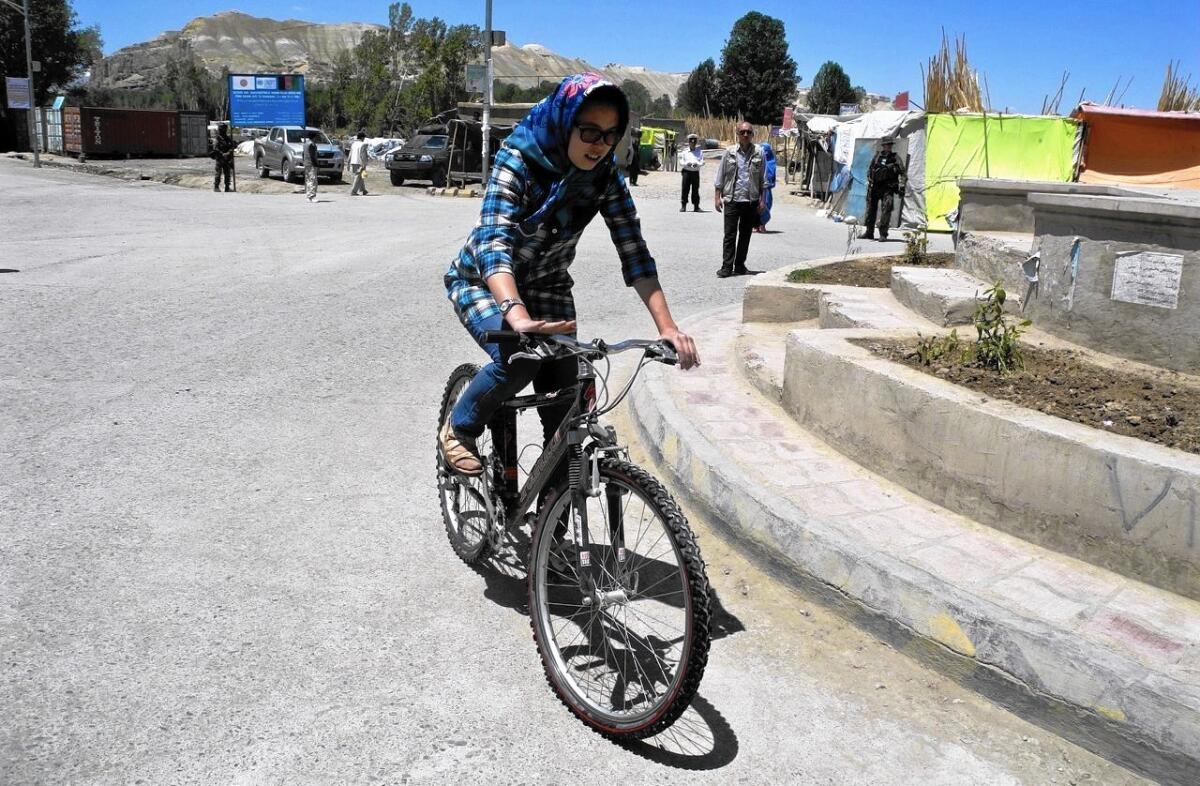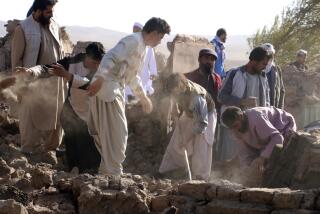Afghanistan’s advocate for bicycling perseveres despite bumpy ride

- Share via
reporting from BAMIAN, Afghanistan — When she first started riding her Chinese-made bicycle through the streets of this central Afghan town three years ago, university student Zahra Hussaini was so careful to not draw attention to herself that she donned men’s athletic clothes.
She had been riding bicycles for years but always kept a low profile. Born a refugee in neighboring Iran, Hussaini found cover in her youth when she bicycled in the Islamic Republic. When she moved to the western Afghan province of Herat, she traveled only short distances to the homes of friends and family.
Bamian, a mostly peaceful, mountainous province west of the capital, Kabul, had no history of women driving cars or riding bikes. One winter morning in 2012, riding along an icy road, she had her first bout with fear.
“The road was slippery and I crashed my bike into an old man standing on the street,” Hussaini said.
Not realizing the rider was a young woman, the man said, “If you don’t know how to ride, then don’t bother.”
Having just started riding her bicycle in Bamian, she momentarily considered responding, but stopped herself. He could have been a conservative elder, she thought, and in Bamian even few men rode bikes. Better to let him think he had shamed a young man, she thought, than risk a dressing-down because of her gender. She hopped back on her bike and rode off.
As time went on, Hussaini became more comfortable and began to dress as herself. At times, people would sneer. Others laughed, pointed or said condescendingly, “Look at that girl.” Hussaini said it was nothing she couldn’t handle.
“No one ever outright insulted me and I just brushed their words off,” she said.
::
When she taught herself to ride in Iran, it was out of a fascination with bicycles and a desire to do what the boys did. In Bamian, however, riding a bicycle was a matter of necessity.
The town has few taxis and women and girls are forced to walk almost everywhere. At Bamian University, a major institution in central Afghanistan, female students such as Hussaini, 23, face additional problems because their dorms are several miles away from campus.
In August, five young women she trained made Afghanistan’s national cycling team. An Afghan Canadian woman who had never ridden a bike learned to ride for leisure under Hussaini’s tutelage.
Eventually, men began to approach her for lessons too.
Among them was an official at her university who had purchased bicycles for himself, his wife and daughter. Hussaini, who is in the final year of earning an archaeology degree, told the man’s wife that she wouldn’t teach her until she had secured her husband’s permission.
“Imagine if he got mad and it affected my academic record,” she said.
A few days later, the official showed up at her house with his wife and daughter, each with a bike by their side.
When she landed a job as an aide to former provincial Gov. Habiba Sarabi, she rode her bike to work with the support of her boss and Sima Samar, the head of the Afghan Independent Human Rights Commission. The two women, among Afghanistan’s most respected female leaders, have come to see her as a daughter.
But she has also faced criticism. Last year during Muharram, the first month of the Islamic calendar, local religious leaders told the large crowds at mosques that females should not ride bicycles.
Without naming her directly, they criticized the trend she started and falsely accused foreign aid agencies of funding an “infidel practice,” she said.
What bothered Hussaini the most was that none of the mullahs ever addressed her face-to-face.
“They knew I was active in civil society groups here so they didn’t want to risk protests by targeting us directly,” she said.
::
Hussaini dubbed the bicycling campaign “Randan Haq-e-mast,” which means “Biking is our right.” Two women she trained placed first and second in provincial cycling competitions last year.
As more Bamiani men and women began to take up cycling, Hussaini said, some religious leaders quieted their opposition.
“None really ever came out in support,” she said, “but they did stop bringing it up.”
She has combined her love of the sport with her passion for Bamian’s historic sites, some of the most notable in Afghanistan.
Last summer she helped organize the Tour De Bamian, a 22-mile ride that took cyclists past the site of 6th century Buddha statues destroyed by Taliban militants in 2001, the ancient citadel city of Gholghola and other landmarks. The competition drew 100 riders, including nine women.
Lately, she has begun working with local and international companies to bring paragliding to the province, allowing visitors to hover above the site of the Buddhas and the crystal blue lakes of Band-e Amir, Afghanistan’s first national park, without creating environmental hazards.
Though many in the province see her as a pioneer, Hussaini said she never sought the attention.
“Bike riding is good for the environment and health,” she said. “I, of course, want more women everywhere to join in.”
Latifi is a special correspondent.
More to Read
Sign up for Essential California
The most important California stories and recommendations in your inbox every morning.
You may occasionally receive promotional content from the Los Angeles Times.












